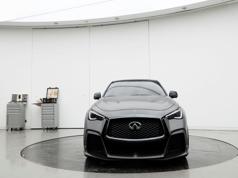Nissan halts US orders for Infiniti SUVs due to Trump tariffs

TOKYO/MEXICO CITY (Reuters) - Japanese automaker Nissan Motor said on Thursday it will stop accepting new orders in the United States for its Infiniti QX50 and QX55 luxury SUVs made in Mexico, after the Trump administration imposed new tariffs on imported cars and trucks.
The decision is part of a plan to scale back production at its joint venture plant with Mercedes-Benz, COMPAS, in Mexico, the company said. Production of the two Infiniti SUVs will continue, but only for markets outside the United States such as the Middle East, Panama, Canada and Mexico. Nissan did not specify how many vehicles will be delivered to those markets.
“We will continue to monitor the market situation and make appropriate adjustments to ensure production and business efficiency,” a Nissan spokesman in Tokyo said.
The move comes shortly after the US imposed a 25% tariff on imported cars and trucks, under a new order that took effect on Thursday. Analysts say Nissan will be among the Japanese automakers hardest hit because it is the largest exporter of cars from Mexico to the US among Japanese automakers.
Nissan previously announced in January that it would cut one shift at its plant in Smyrna, Tennessee, but would maintain two shifts there to produce the Nissan Rogue, its best-selling vehicle in the US.
Nissan’s troubles in the US are not just due to tariffs, but also to its aging product line and lack of hybrid options, which have left it lagging behind rivals like Toyota and Hyundai amid a sharp shift toward fuel-efficient vehicles.
Under new CEO Ivan Espinosa, a 46-year-old Mexican who previously served as product planning director, Nissan is planning to shorten its development time for new vehicles in an effort to regain its competitive edge in the global market.
Meanwhile, its COMPAS plant in Mexico, which produces both Infiniti and Mercedes-Benz’s GLB SUV, now faces an uncertain future following new US trade policies.
Nissan has cut its profit forecast three times for the fiscal year just ended and recently had its credit rating downgraded to "junk", reflecting the growing pressure it faces amid an increasingly unpredictable global business environment.
